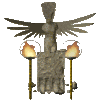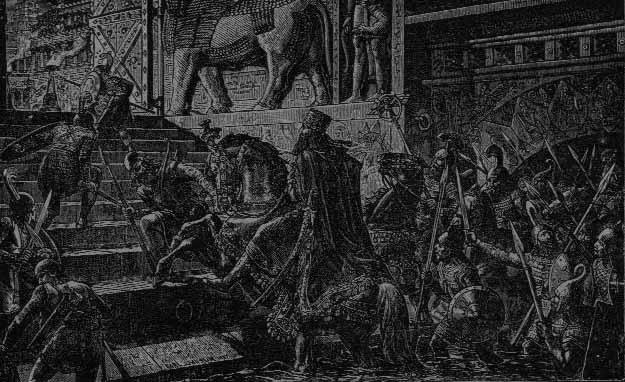|
|
|
 Conquest
of Babylon
Conquest
of Babylon

In his advance toward the dominions of Croesus in Asia Minor, Cyrus had passed to the northward of the great and celebrated city of Babylon. Babylon was on the Euphrates River, toward the southern part of Asia. It was the capital of a large and very fertile region, which extended on both sides of the Euphrates toward the Persian Gulf. The limits of the country, however, which was subject to Babylon, varied very much at different times, as they were extended or contracted by revolutions and wars. The River Euphrates was the great source of fertility for ht whole region through which it flowed. The country watered by this river was very densely populated. Babylon was a city of immense extent and magnitude. There were huge walls surrounding the City. The walls were made of bricks, and the bricks were formed of clay and earth, which was dug from a trench made outside of the lines. This trench served the purpose of a ditch, to strengthen the fortification when the wall was completed. The water from the river, and from streams flowing toward the river, was admitted to these ditches on every side, and kept them always full. The River Euphrates itself flowed through the city.
It was not surprising that Cyrus, having been so successful in his enterprise thus far, should now begin to turn his thoughts toward this great Babylonian Empire, and to feel a desire to bring it under his sway. The first thing however was to confirm and secure his Lydian conquests. He spent some time, therefore, in organizing and arranging, at Sardis, the affairs of the new government which he was to substitute for that of Croesus there. He designated certain portions of his army to be left for garrisons in the conquered cities. He appointed Persian officers, of course, to command these forces; but, as he wished to conciliate the Lydians, he appointed many of the municipal and civil officers of the country from among them. There would appear to be no danger in doing this, as, by giving the command of the army to Persians, he retained all the real power directly in his own hands.
One of these civil officers, the most important, in fact, of all, was the grand treasurer. to him Cyrus committed the charge of the stores of gold and silver which came into his possession at Sardis, and of the revenues which were afterward to accrue. Cyrus appointed a Lydian named Pactyas to this trust, hoping by such measures to conciliate the people of the country, and to make them more ready to submit to his sway. Things being thus arranged, Cyrus, taking Croesus with him, set out with the main army to return toward the East.
As soon as he had left Lydia, Pactyas excited the Lydians to revolt. The name of the commander-n-chief of the military forces which Cyrus had left was Tabalus. Pactyas abandoned the city and retired toward the coast, where he contrived to raise a large army, formed partly of Lydians and partly of bodies of foreign troops, which he was enabled to hire by means of the treasures which Cyrus had put under his charge. He then advanced to Sardis, took possession of the town, and shut up Tabalus with his Persian troops, in the citadel.
When the tidings of these events came to Cyrus, he was very much incensed, and determined to destroy the city. Croesus, however, interceded very earnestly in its behalf. He recommended that Cyrus, instead of burning Sardis, should send a sufficient force to disarm the population. Cyrus decided on adopting this plan. He dispatched a Median named Mazares, an officer of his army, at the head of a strong force, with orders to go back to Sardis, to deliver Tabalus from his danger, to seize and put to death all the leaders in the Lydian rebellion excepting Pactyas. Paxtyas was to be saved alive, and sent a prisoner to Cyrus in Persia.
Pactyas did not wait for the arrival of Mazares. As soon as he heard of his approach, he abandoned the ground, and fled northwardly to the city of Cyme, and sought refuge there. When Mazares had reached Sardis and re-established the government of Cyrus there, he sent messengers to Cyme, demanding the surrender of the fugitive.
The people of Cyme were uncertain whether they ought to comply. They did comply at first. They were accordingly making arrangements for giving Pactyas to the Persians, when one of the citizens, a very prominent and influential man, named Aristdicus, expressed himself not satisfied by this. The people of Cyme did not want to give up Pactyas, nor did they want to incur the enmity of the Persians by retaining and protecting him. They accordingly sent him away secretly. The emissaries of Mazares, however, followed him. They kept constantly on his track, demanding him successively of every city where the hapless fugitive sought refuge, until, at length, partly by threats and partly by a reward, they induced a certain city to surrender him. Mazares sent him, a prisoner to Cyrus. Soon after this Mazares himself died, and Harpagus (the Median commander under Astyages who helped Cyrus Conquer Media, and who defied Astyage's orders to kill Cyrus when Cyrus was born) was appointed governor of Lydia in his stead.
In the mean time, Cyrus went on with his conquests in the heart of Asia, and length, in the course of a few years, he had completed his arrangements and preparations for the attack on Babylon. He advanced at the head of a large force to the vicinity of the city. The King of Babylon, whose name was Belshazzar, withdrew within the walls, shut the gates, and felt perfectly secure. A simple wall was in those days a very effectual protection against any armed force whatever, if it was only high enough not to be scaled, and thick enough to resist the blows of a battering ram. Belshazzar knew well that his walls would bid all such modes of demolition a complete defiance. He stationed his soldiers, therefore, on the walls, and his sentinels in the watch towers, while he himself, and all the nobles of his court, feeling perfectly secure in their impregnable condition, and being abundantly supplied with all the means that the whole empire could furnish, both for sustenance and enjoyment, gave themselves up, in their spacious palaces and gardens, to gayety, festivity, and pleasure.
Cyrus advanced to the city. He stationed one large detachment of his troops at the opening in the main walls where the river entered into the city, and another one below, where it issued from it. These detachments were ordered to march into the city by the bed of the river, as soon as they should observe the water subsiding. He then employed vast force of laborers to open new channels, and to widen and deepen those which had existed before, for the purpose of drawing off the waters from their usual bed. When these passages were thus prepared, the water was let into them one night, at a time previously designated, and it soon ceased to flow through the city. The detachments of soldiers marched in over the bed of the stream, carrying with them vast numbers of ladders. With these they easily scaled the low walls which lined the banks of the river, and Belshazzar was thunderstruck with the announcement made to him in the midst of one of his feasts that the Persians were in complete and full possession of the city.
If you have any questions or comments feel free to e-mail me.
Senior Project : 2001-2002 The Great Persian Empire Website